Dust by Arthur Slade
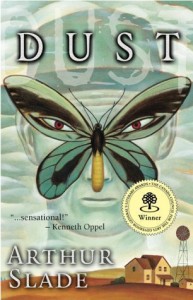 Summary: When Robert’s younger brother Matthew disappears while on a walk to town, his whole family is overcome with worry and grief. There’s no trace of him, but a stranger named Abram’s appearance in town shifts the community’s focus quite suddenly from the missing child to growing a successful crop of wheat in spite of the drought they’ve been having. Robert seems to be one of the few who notices this abrupt change. Feeling Abram’s pull himself, Robert struggles to figure out what is really going on while trying to hold on to his thoughts, imagination and the memory of Matthew. As things start unravelling, the truth is stranger than the wildest stories he has ever read in the past.
Summary: When Robert’s younger brother Matthew disappears while on a walk to town, his whole family is overcome with worry and grief. There’s no trace of him, but a stranger named Abram’s appearance in town shifts the community’s focus quite suddenly from the missing child to growing a successful crop of wheat in spite of the drought they’ve been having. Robert seems to be one of the few who notices this abrupt change. Feeling Abram’s pull himself, Robert struggles to figure out what is really going on while trying to hold on to his thoughts, imagination and the memory of Matthew. As things start unravelling, the truth is stranger than the wildest stories he has ever read in the past.
Number of Pages: 168
Age Range: 12-14
Review: As I wrote in my Tumblr post today, Dust by Arthur Slade starts out in the style of W.O. Mitchell but then turns into Ray Bradbury., which explains the dedication and other articles I’ve read where Slade talks about his book.
I just read Who Has Seen the Wind by W.O. Mitchell yesterday, and I admit, it took me awhile to get into Slade mode. I had thought the two books would be more similar than they actually were, but I should have known from the previous two Slade books I’ve read during my Marathon of Books that a twist was practically guaranteed.
And I enjoyed it. Author Kevin Sylvester is right, Slade has tons of talent. Abram is worthy, mysterious villain and Robert’s ability to see through his lies is quite intriguing. In a way, it’s steampunk on the prairie. If a farmer boy in the middle of Saskatchewan can have a steampunk adventure, because it seems like an unlikely combination. Maybe I don’t have my steampunk terms down just yet. I do know Robert is the only one who can rescue the town if he has enough free will left over to do so.
I was both happy and saddened by the ending, as well as completely surprised. I have questions about shady details of course, but overall I enjoyed what Slade’s story had to offer. If you read it, it won’t be what you expect, it’ll be better.
Slade, you’ve been marked. I may have been somewhat blissfully unaware of your writing before my Marathon of Books, but now that I am, I’ll keep looking for your new ones. Because when it comes down to your writing, there’s something about it that I just can’t stay away from.
Memorable Quotes:
“Robert shrugged. He had to admit to himself that he enjoyed hearing the swear words – they were real, weighty. Old and Powerful. They grabbed your attention. Of course, there was Someone’s attention wouldn’t want to attract. ‘God might zap you with lighting,’ Robert warned.” – Robert from Dust by Arthur Slade, page 80
Dust by Arthur Slade, is published by HarperCollins Publishers, (2001).
Who Has Seen the Wind by W.O. Mitchell
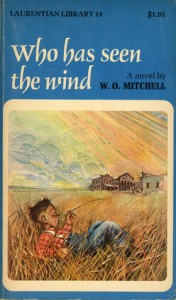 Summary: Living in smalltown Saskatchewan in the 1930s, Brian is experiencing his childhood in a harsh environment based on survival against the elements and each other. A sensitive child, Brian has a sense of there being something deeper to life, but can’t quite grasp what it is. This feeling flickers throughout the years, becoming stronger when he is around the younger Ben, but great loss enters his life increasing his questions and despair. Brian’s journey through childhood is highlighted by the parallel stories of the people who live in his community, and influence his reach for something more, whether they know it or not.
Summary: Living in smalltown Saskatchewan in the 1930s, Brian is experiencing his childhood in a harsh environment based on survival against the elements and each other. A sensitive child, Brian has a sense of there being something deeper to life, but can’t quite grasp what it is. This feeling flickers throughout the years, becoming stronger when he is around the younger Ben, but great loss enters his life increasing his questions and despair. Brian’s journey through childhood is highlighted by the parallel stories of the people who live in his community, and influence his reach for something more, whether they know it or not.
Number of Pages: 301
Age Range: 17-18
Review: Where do I start? There is so much to say about a Canadian classic like Who Has Seen the Wind by W.O. Mitchell.
First of all, I love Mitchell’s style of writing. He has an incredible ability to give a character flavour and personality through their dialogue. He also is able to deliver one-line zingers that get straight to the heart of a situation. Take this one for example: “In the years they had attended school, Tang and Vooie had been subjected to periodic ostracism, a mild form of persecution usually started by Mariel, a full-faced little sadist of ten years.” (W.O. Mitchell, page 141) I laughed because Mitchell’s writing is funny at times, and I cried because his characters touched me.
Mitchell’s book is a seminal piece of work because it captures a slice of smalltown politics and prairie life through honestly portrayed characters with complicated motivations. Through the childhood of Brian, Mitchell explores the impact of the land and nature on human life, as well as how some use ‘faith’ to cover hardened hearts and a multitude of sins.
There are so many beautiful moments in this book: the love of Brian’s parents for him and his brother Bobbie, the younger Ben’s connection to nature and God-like ability to pop up whenever someone or something is being harmed or tortured, the devotion Mr. Digby and Miss Thompson had to their students, the wonderful animal characters and Brian’s growing awareness from a tender age of the wondrous and divine.
As Brian knows from the beginning though, life is filled with both sorrow and laughter. He is continually reminded of this throughout the story as he grows, but still remains touched by something more. Brian is not bitter, but is searching for meaning and purpose. Fortunately he has so many people in his life who love him and are willing to help him with his questions. While some townspeople have less than stellar motivations, there are others like Brian also struggling with the concepts of God and faith in a harsh reality.
Who Has Seen the Wind is a powerful character driven story that encourages readers to ponder what life is really about. And like Brian, I know I haven’t figured out everything either, but I hope one day I will get to a more complete understanding of life as he hopes as well. Books like Mitchell’s are part of getting there.
Memorable Quotes:
“Many interpreters of the Bible believe the wind to be symbolic of Godhood. In this story I have tried to present sympathetically the struggle of a boy to understand what still defeats mature and learned men – the ultimate meaning of the cycle of life. To him are revealed in moments of fleeting vision the realities of birth, hunger, satiety, eternity, death. They are moments when an inquiring heart seeks finality, and the chain of darkness is broken.
This is the story of a boy and the wind.” – Preface from Who Has Seen the Wind by W.O. Mitchell
“Shadows lengthen; the sunlight fades from cloud to cloud, kindling their torn edges as it dies from softness down the prairie sky. A lone farmhouse window briefly blazes; the prairie bathes in mellower, yellower light, and the sinking sun becomes a low and golden glowing on the prairie’s edge.” – From Who Has Seen the Wind by W.O. Mitchell, page 61
“Before the maple dresser opaled with little birds’-eyes Maggie O’Connal, with her dark head tilted as though in listening attitude, braided her hair for the night. It was like being on the other side of a fence. Other people, she decided, must feel the smae about the bits that had broken away from their own bodies to live on the other side of the fence – to have lives of their own. Dear God, she wished fiercely, make them turn out all right – not just all right: world beaters – the best there was. She heard the cavern sounds of the coal shovel below. Like their father – that would be enough.” – Maggie from Who Has Seen the Wind by W.O. Mitchell, page 100
“‘What’s real. I’ll tell you – the beginnin’ – that’s gettin’ born: the end – that’s gettin’ dead . . . Both of them is real – good an’ real.’
The bell tinkled again, and Brian O’Connal stood by the counter. Milt paid no attention to him. ‘In between there’s hunger an’ there’s sleepin’ an’ wakin’ an’ there’s wimmen an’ this here brew at the Ben’s. Them things is real. Along comes Powelly or your friend got diddled outa his church – whatta they do? Somebody dies, they’re right handy with the Heavenly Land on High an’ a shiny box an’ flowers an’ a lotta things ain’t got nothin’ whatsoever to do with bein’ dead. You know what death is? Rotting – stink – dust – an’ you’re back to the prairie again. Take birth – what’s that? Sprinkling with water? Announcement cards? Seegars? Hospital ward? Hell no! Blood an’ water an’ somethin’ new for a while – mebbe a shoemaker that wishes he was a tree.’
‘Have you seen my brother?’ asked Brian.
‘They’re all a-scairt of reality unless they thought her up. Scairt silly; so they pretty her up – ‘cept one of ’em. God – I wish I was a tree!’
Brian on tiptoe at the counter started at Mr. Palmer. He saw Mr. Digby in his stocking feet with an intent look upon his face. ‘You forgot thinking, Milt.’
‘No – I didn’t forget her – but I’ll throw her in jist to please you – ’tain’t worth a damn. Death – birth – love – hunger – wakin’ – sleepin’ – drinkin’ . . . That’s reality – not what you think about them.'” Conversation about the reality of life between Mr. Palmer and Mr. Digby from Who Has Seen the Wind by W.O. Mitchell, pages 138-139
“The buck and the doe that Mr. Hoffman had brought home came of a particularly fertile strain, the boys found out during the course of the summer; they were delighted as litter after litter made its appearance and the rabbit population of Hoffman’s back yard increased by arithmetic progression. The increase soon became an alarming thing, however, as it became apparent that few of the progeny seemed inclined to death and that none seemed to have heard of Malthusian theory. The boys began to have difficulty in finding food for the rabbits.” – Brian and his friends run into trouble when Fat gets rabbits for Easter from Who Has Seen the Wind by W.O. Mitchell, pages 165-166
“A forever-and-forever sound it had, forever and for never. Forever and forever the prairie had been, before there was a town, before he had been, or his father, or his father, or his father before him. Forever for the prairie; never for his father – never again.
People were forever born; people forever died, and never were again. Fathers died and sons were born; the prairie was forever, with its wind whispering through the long, dead grasses, through the long and endless silence. Winter came and spring and dall, then summer and winter again; the sun rose and set again, and everything that was once – was again – forever and forever. But for man, the prairie whispered – never – never. For Brian’s father – never.
And as the boy stood with the prairie stretching from him, he knew that things were different now – forever and forever – forever the dark well of his mother’s loneliness, forever the silence that would never end.” – Brian pondering the greater themes of life from Who Has Seen the Wind by W.O. Mitchell, page 245
Who Has Seen the Wind by W.O. Mitchell, is published by Macmillan of Canada, (1947).
Draco’s Child by Sharon Plumb
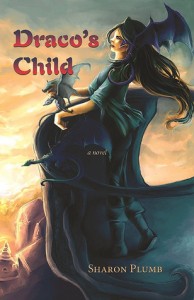 Summary: A settler on a new planet with her parents and younger brother, Varia loves the story of the constellation of a dragon and its rider in the skies above her new home. But when the rider appears in physical form, calling himself Specto, the star-child, Varia isn’t sure of his true intentions. Soon after meeting him, Varia discovers what she realizes is an egg in a cave, and Specto’s reaction to it makes her want to protect it even more. Specto’s star water is making the people in her community younger and healthier, but when the egg hatches and a dragon appears, Varia gets a different part of the story. As her friendship with the dragon she names Galatea grows, Varia becomes convinced Specto is leading everyone astray, until Varia’s own body begins to change, and not in a ‘becoming a woman’ kind of way.
Summary: A settler on a new planet with her parents and younger brother, Varia loves the story of the constellation of a dragon and its rider in the skies above her new home. But when the rider appears in physical form, calling himself Specto, the star-child, Varia isn’t sure of his true intentions. Soon after meeting him, Varia discovers what she realizes is an egg in a cave, and Specto’s reaction to it makes her want to protect it even more. Specto’s star water is making the people in her community younger and healthier, but when the egg hatches and a dragon appears, Varia gets a different part of the story. As her friendship with the dragon she names Galatea grows, Varia becomes convinced Specto is leading everyone astray, until Varia’s own body begins to change, and not in a ‘becoming a woman’ kind of way.
Number of Pages: 269
Age Range: 13-16
Review: Once I got over my confusion about a star being a physical being on a foreign planet and the reference to a constellation as something appearing in the sky and in reality, I was taken with Draco’s Child by Sharon Plumb. I absolutely loved the scientific aspect of it, landing on a new planet as settlers, bringing the plants and crops of Earth and expecting things to be quite similar when planting in a new location. Plumb captures the arrogance of this assumption, while combining science fiction with fantasy on a planet where it seems the impossible is possible.
On this planet, the mythical figures in the stars aren’t mythical after all. Dragons are real, and Varia befriends one when she rescues an egg and facilitates its’ hatching. Plumb develops Galatea’s dragon character with distinctive dialogue that serves to move the story along, and I got the gist of what was being said, but I ended up wishing she had included a glossary of terms in the back of the book.
The whole story about the different fungus located on the planet and how they affect all living things as well as how they came to be there in the first place was fascinating. The fantasy part with the dragons was equally fascinating, especially with the twists and turns when fantasy and science collide to create some unfortunate circumstances.
There were only two things holding me up from completely enjoying Draco’s Child. The first was Specto’s appearance on the planet. I just didn’t understand how a star could be a person too, and eventually I just had to let go of my disbelief to get into the story. And the second was the ending, because I just didn’t understand exactly what happened to Specto and the eggs. Were the eggs still able to hatch?
It was a thought-provoking read with action and educational aspects, plus, it was just a fun read. Maybe I didn’t always know exactly what was going on, but I understood enough to thoroughly enjoyed the adventure of reading it.
Memorable Quotes:
“So she couldn’t just be herself – whatever that meant now. It had been foolish of them, naive humans, to think that they could move to a completely alien place and not be changed themselves. To imagine that carrot seeds and readers were enough to carry them into a new life.” – Varia from Draco’s Child by Sharon Plumb, page 198
Draco’s Child by Sharon Plumb, is published by Thistledown Press, (2010).
Mostly Happy by Pam Bustin
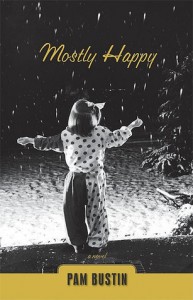 Summary: From a young age, Bean has had to take care of herself. With a mother who continually brings home abusive boyfriends and a father who raped her when she was six years old, Bean has no other choice. Her mother’s new husband terrorizes their family with violence and intimidation, but what Bean doesn’t know at the time is that her younger sister is now the one being taken advantage of. Looking back over the memories of her childhood, Bean examines each carefully, slowly putting the pieces together and realising all of the past trauma she has been suppressing. Her reflection sparks new realizations, hopefully giving her a new foundation to build her future life on.
Summary: From a young age, Bean has had to take care of herself. With a mother who continually brings home abusive boyfriends and a father who raped her when she was six years old, Bean has no other choice. Her mother’s new husband terrorizes their family with violence and intimidation, but what Bean doesn’t know at the time is that her younger sister is now the one being taken advantage of. Looking back over the memories of her childhood, Bean examines each carefully, slowly putting the pieces together and realising all of the past trauma she has been suppressing. Her reflection sparks new realizations, hopefully giving her a new foundation to build her future life on.
Number of Pages: 272
Age Range: 17-18
Review: Like yesterday’s Necking With Louise by Rick Book, Mostly Happy by Pam Bustin is another contemplative read. Bean has a suitcase that holds memorabilia from all of the important moments of her life, and the story is about her examining each of the trinkets one by one.
I did care about Bean. Truly horrible things happened to her again and again. She never deserved it, and I never blamed her for taking care of herself when she needed to. She was her own best ally.
Bustin’s writing is skilled and smooth, but seems to underplay everything Bean has actually gone through. Even though this is initially because Bean herself is repressing everything, when Bean does come to face the truth she still doesn’t name what happened to her. She has some anger toward God, but still attends a bible college. Physically, sexually and emotionally abused, not to mention raped on several occasions, Bean seems remarkably minimally affected by her experiences.
What I have trouble understanding is the mixed message of Bean’s sister’s story. Also abused and raped, Dee repeatedly tries to committee suicide. Bean can’t take responsibility for her sister’s actions, and yes, Dee is responsible for the decisions she makes, but I felt her story was more believable than Bean’s. She just seems more affected by what has happened to her in the past, although it’s kind of written off as her being attention-seeking. Her pregnancy was a surprise though, and did cause her to make some positive changes. In a way I thought Dee was better equipped at dealing with her feelings than Bean was, because she was able to admit something was wrong. While portrayed as a victim, Dee does make good and bad choices. It’s not black and white.
I wanted to know more beyond the idealized memories Bean sometimes has of what happened. I also am left with an overwhelming desire to reread From Anna.
Memorable Quotes:
“He sighed. ‘Sprout, most people would rather just throw a broken thing away. They don’t want to take the time to figure out how to fix anything.'” – Grandpa Tom from Mostly Happy by Pam Bustin, page 18
“I didn’t mind moving. I liked picking out my room, finding the right place for my books. I liked the places best before we moved in, all bright and clean and empty, the beginning of a whole new story.” – Bean from Mostly Happy by Pam Bustin, page 46
“It was no big deal. I just went away while it happened – like I always did. Going away is easy. You just blink and you’re up and out of your body – watching from the ceiling. You don’t feel what’s happening to the body when you go away. You can even watch, it doesn’t hurt. When I went away, I started up music inside my head to cover the sounds of what was happening. Jangly steel guitar. Sometimes, I’d ride that guitar right out onto the prairie, into the tall grass where no one could find me. I didn’t do that very often, though. It’s dangerous. Mostly, you have to watch, just in case.” – Bean from Mostly Happy by Pam Bustin, page 68
“My hands started to shake. My throat hurt. I wished I could cry. I couldn’t remember the last time I cried. I wished I could slip out of the body – but I couldn’t. No jangly guitars, no watching from above. Just tea and aching. I had left home.
My eyes watered, a little.” – Bean from Mostly Happy by Pam Bustin, pages 180-181
“I really did want to be one of these shiny people that were so sure about their place and purpose in the world, but it was tough. I spent a lot of time roaming the hills of England in the fog, screaming at God for bringing me to a place where all they seemed the real questions that would lead us into . . . Into what? Into a fuller understanding of God and ourselves. Into God’s middle as Anna would say.” – Bean from Mostly Happy by Pam Bustin, page 202
Mostly Happy by Pam Bustin, is published by Thistledown Press, (2008).
Necking With Louise by Rick Book
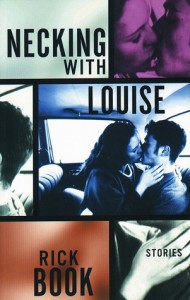 Summary: A collection of short stories, Necking With Louise follows the experiences of Eric, a teenage boy living in Lashburg, Saskatchewan in 1965. He’s a brother, a boyfriend, a hockey player, a son, a grandson and a hard worker, and each story adds to the portrait of a young man finding his way through the pitfalls of growing up, as well as the experience of loss. With an introspective nature, a sense of wonder and responsibility, Eric meets each experience in a forthright and endearing way.
Summary: A collection of short stories, Necking With Louise follows the experiences of Eric, a teenage boy living in Lashburg, Saskatchewan in 1965. He’s a brother, a boyfriend, a hockey player, a son, a grandson and a hard worker, and each story adds to the portrait of a young man finding his way through the pitfalls of growing up, as well as the experience of loss. With an introspective nature, a sense of wonder and responsibility, Eric meets each experience in a forthright and endearing way.
Number of Pages: 151
Age Range: 16-18
Review: Imagine a wall of a stranger’s photographs. Each picture is of a different experience, and all of the information you have about those experiences are contained in that photo. You must look at the pictures as closely as you can, glean what you can and move on, because there is no one to answer your questions or requests for further information.
Because that’s what photographs are: snapshots of life. They don’t tell the whole story, instead they capture a moment in time, preserving it to be examined, remembered and cherished in the future.
Necking With Louise by Rick Book is a collection of snapshots then, all of key moments in Eric’s teen years. Each story comes alive, and when the story is over it is time to pick up and consider the next photo. They are stories that sparkle with the vibrancy of growing up, told by Eric himself, a remarkably self-aware teen who examines himself and the deeper meaning of life on a continual basis. From his last midget hockey game to waiting out a blizzard with his horse Paddy in the woods to his first relationship and his first job, Eric’s perspective of each event is memorable and heartfelt. A notable character coupled with Book’s exquisite writing drives the novel, making it a valuable read for anyone who appreciates stories driven by character development, and vivid portrayals of life in other provinces, this one being Saskatchewan.
This is not a book for readers who like neat, clear endings and a fast-paced plot. It is for the contemplative; those who understand sometimes reading is about having the privilege of bearing witness to life. And that sometimes what is not being said is not as important as what is.
My absolute favourite snapshot was Sun Dogs, the story of Eric and his horse Paddy when they get stuck outside during a blizzard, but I truly enjoyed sifting through all of Book’s pictures of Eric. I encourage you to pick up the photo album and examine them for yourself. I don’t think you’ll be disappointed.
Memorable Quotes:
“Maybe it’s what happens to people caught in disasters. They start making tough decisions, but by then the decisions aren’t so tough. The idea just came. Maybe it had been there, lingering in the dark for a while. But I know what I had to do, knew what would increase my odds of seeing daylight.” – Eric in Sun Dogs from Necking With Louise by Rick Book, page 72
“Something in her question, in the way Louise held her head . . . I don;t know . . . suddenly made me look at us as if from a distance and high above. I looked down and saw my car on the dark road with two long V’s of lights probing the black ahead like some insect’s antennae. From up there we looked very tiny in the great darkness of the prairies. And our lives seemed so insignificant. It was such a big feeling that it made me a little sad, like we were all alone out here on this planet and I was very lucky to be with this girl.” – Eric in Necking With Louise from Necking With Louise by Rick Book, pages 87-88
Necking With Louise by Rick Book, is published by Red Deer Press, (1999).
Power Plays by Maureen Ulrich
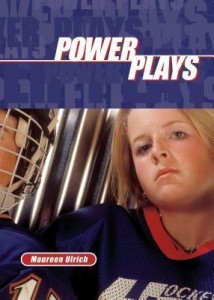 Summary: With a move from Saskatoon to Estevan, Saskatchewan, Jessie Mac is forced to start grade nine in a new school two weeks after the new school year has already started. Targeted by a bully named Kim, Jessie finds out Kim has been spreading lies about her, antagonizing an older girl named Marsha who shows up at her house and raids her parents’ liquor cabinet. In order to get Marsha and her friends out of her house, Jessie agrees to go with them, spending a night in jail thanks to their antics. But the police officer in charge sees Jessie is a good kid and encourages her to join the local girls’ hockey team. Used to playing ringette, Jessie, though reluctant at first, comes around, finding friends, support, a potential romantic interest and love for a sport that she just can’t get enough of.
Summary: With a move from Saskatoon to Estevan, Saskatchewan, Jessie Mac is forced to start grade nine in a new school two weeks after the new school year has already started. Targeted by a bully named Kim, Jessie finds out Kim has been spreading lies about her, antagonizing an older girl named Marsha who shows up at her house and raids her parents’ liquor cabinet. In order to get Marsha and her friends out of her house, Jessie agrees to go with them, spending a night in jail thanks to their antics. But the police officer in charge sees Jessie is a good kid and encourages her to join the local girls’ hockey team. Used to playing ringette, Jessie, though reluctant at first, comes around, finding friends, support, a potential romantic interest and love for a sport that she just can’t get enough of.
Number of Pages: 302
Age Range: 12-13
Review: I enjoy Maureen Ulrich’s writing because she explains hockey in a way that makes sense to me. My knowledge of how the game actually works is limited, and I usually find reading about it to be tedious. But Ulrich writes about the game in an engaging way, involving characters with a passion for playing.
Once again, I am reading my books in the wrong order, having started with Breakaway, the last book of the Jessie Mac trilogy before my Marathon of Books. Power Plays, the book I read today, is the first in the series, and tells the story of how Jessie gets into hockey in the first place. A stranger in a new town and a new school, Jessie is not making friends or adapting well because she is being bullied. Her grades are going down, and while some teachers mean well, Jessie finds herself dealing with a surprise visit from an older girl named Marsha who believes Jessie has bad-mouthed her.
Her encounter with Marsha ends up being a turning point in Jessie’s life though when the police officer suggests she make some new friends by joining his daughter’s hockey team.
Jessie’s a great character who grows to love the game. And when her bully becomes a teammate, Jessie eventually does her best to smooth things over between them. Thrust into the world of girls’ hockey, Ulrich’s reader learns the intricacies of playing on a girls’ team and being a girl playing on a boys’ team and the challenges of both. By the end of the novel Jessie’s team is competing for the provincial championships, and she has a new and loyal group of friends who have her back in any situation.
It’s a younger teen read, and while I liked the story itself, I also appreciated Ulrich’s Author’s Note about the seriousness of bullying with tips on how to deal with it.
Memorable Quotes:
“‘But most of all I’m sick to death of people not taking this sport seriously. I’m sick of the radio station not broadcasting your scores. I’m sick of having to beg for ice time so we can play three real periods of hockey. I’m sick of never playing a single game in the Civic Auditorium. I’m sick of not having a league to play in. Do you understand what I’m saying?'” – Coach Steve talking about the lack of respect the girls hockey team from Power Plays by Maureen Ulrich, page 205
“‘You have to quit blaming everyone else when things go wrong. Sometimes life just sucks – and it’s nobody else’s fault.'” – Jessie from Power Plays by Maureen Ulrich, page 274
Power Plays by Maureen Ulrich, is published by Coteau Books, (2007).




 Amy Mathers has been passionate about reading from a very young age, and hopes others will share her enthusiasm for funding a teen book award.
Amy Mathers has been passionate about reading from a very young age, and hopes others will share her enthusiasm for funding a teen book award. 





